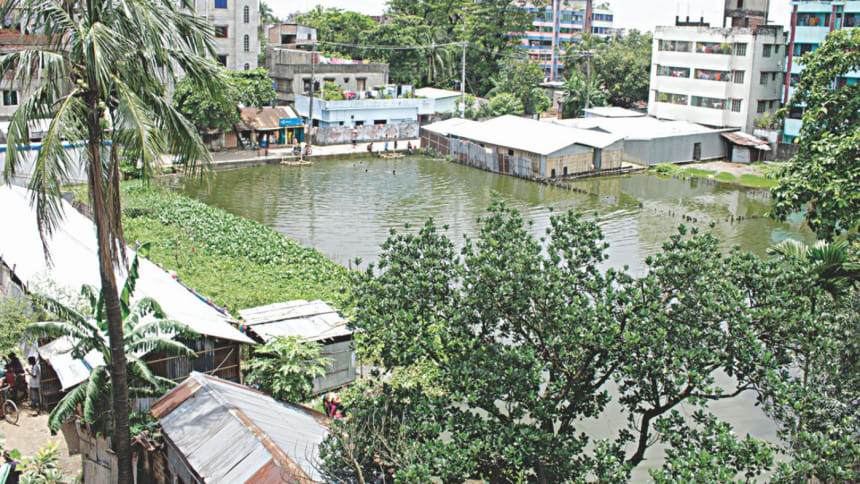No one here goes to jail for filling up water bodies

Though hundreds of ponds and other water bodies were grabbed and filled in the last two decades in the port city, nobody has been jailed for the crime.
Occupying water bodies, open spaces, playgrounds and parks is a punishable offence, according to the Environment Conservation Act.
As per the law, an accused can be awarded either five years of imprisonment or a fine of Tk 50,000 or both if found guilty of grabbing any water body.
The law also prevents people from using the water for commercial purposes without permission from the Department of Environment (DoE).
Between 1991 and 2007, the port city lost 14,727 water bodies, yet there is no record of anyone taking permission from the DoE or anyone being sent to jail for grabbing water bodies, sources told The Daily Star citing surveys conducted by the fisheries department and the Chittagong Development Authority.
Saiful Islam, public prosecutor of environment court, told this newspaper that no verdict had been delivered in cases filed since 2005 in connection with grabbing water bodies.
He said four such cases were now pending with the court. Two of them under trial, and the remaining two were at the investigation stage.
Data obtained from the DoE office in Chittagong show that in the last 12 years, only three cases were lodged for occupying water bodies.
Director of Chittagong DoE Azadur Rahman Mallic told this correspondent they hardly opted for filing cases against the accused, as it takes a long time to get a judgment. When they conducted mobile courts, they just fine the accused, he said.
"Fine is the instant punishment we award the accused. If the step does not prevent water bodies from being grabbed, we go for the next step … filing cases and issuing notices," he added.
Environment activist Sharif Chowhan backs up the DoE director of Chittagong. “There are only instances of fining the accused for filling up water bodies,” he said, adding that they have not seen anyone being sent to jail for the crime. He blamed this for the fast depletion of water bodies in Chittagong city.
If a survey is conducted now, it would be found that the number of ponds and other water bodies is lower than 4,523, said Sharif, president of People's Voice, a rights and environment organisation.
Rajapukur is in Andarkilla area of Chittagong city. “Raja” means king and “pukur” means pond. The place has no ponds anymore. Residential buildings have been built on the pond.
Like Rajapukur, there are many other ponds and water bodies that have been lost to rapid unplanned urbanisation. Dewanji Pukur, Rother Pukur, Moulovir Pukur, Dammarpukur, Mailler Pukur, Poddo Pukur, Baluardighi, Kamaldoho Dighi, Hajar Dighi and Chowdhury Dighi to name a few.

 For all latest news, follow The Daily Star's Google News channel.
For all latest news, follow The Daily Star's Google News channel. 








Comments